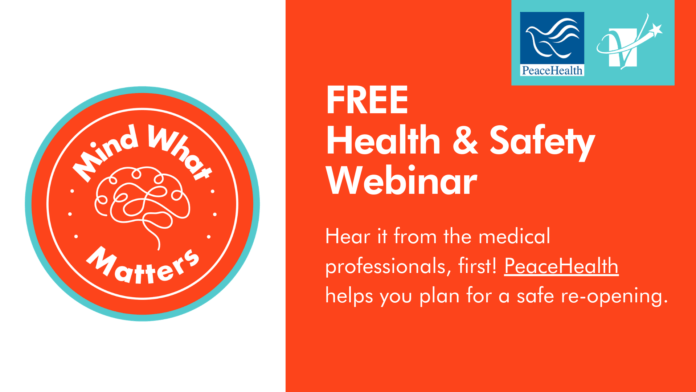Last week’s Mind What Matters Webinar, presented by the Greater Vancouver Chamber of Commerce (GVCC), aimed to address COVID-19’s impact on Washington businesses and provide steps to prepare and maintain a safe workplace. The June 18 webinar was kicked off by Janet Kenefsky, GVCC vice president of membership & operations, who introduced both speakers for the webinar – PeaceHealth’s Director of Infection Prevention Catherine Kroll and PeaceHealth Chief Executive Sean Gregory.
“The focus here is how can we help our organizations be successful with COVID, not necessarily when are not going to have COVID,” Gregory said. “I feel like PeaceHealth is a living testament as to we can do our mission outside of COVID with COVID. I think that applies to all of your organizations.”
Kroll said the goal of the webinar was to offer ideas on the business side on how they can partner with those businesses and what that might look like keeping people safe in your business.
Kroll started out the webinar with some statistics and what is actually known about COVID-19, including symptoms, how it’s most commonly spread, etc. She said the most likely way the virus is spread is being in close proximity to someone who is shedding the virus for a prolonged period of time. She also discussed some of the current unknowns.
“We don’t know about the next wave,” Kroll said. “We could continue at this slow and steady pace, and as an epidemiologist, that is kind of my hope for us is that we have the slow-and-steady pace that doesn’t overwhelm our healthcare facilities, and that we can see hotspots of spread and effectively treat those hotspots the same way that you would a fire, which is turn our hoses on get our resources, and not have to do widespread shutdowns again. My biggest worry would be if we went all summer and had very few cases that as the respiratory/influenza season starts up in late October, we would see a tremendous spike in cases at that point in time and overwhelm our hospitals.”
In regards to how businesses can get back to work safely during the pandemic, Kroll said there are three key points to address:
- People who work for us must feel safe at work.
- Customers must feel safe to come to your place of business.
- Inspire confidence in our government partners/don’t be the source of spread.
Kroll stressed that it’s important to have “really solid written plans” in place for your business that include procedures and policies for making the working environment safe.
“Working from home, if that is something that can work for your business model, it’s absolutely the best thing you can do,” she said. “Virtual meetings, rethinking how we use some of these online platforms and how do we do that. For example, I had an online appointment with a stylist from a local business to purchase some clothing. I was able to go pick up from the store, return ones that didn’t fit right, etc.”
Kroll said if you are a business that does need to have people in the office, masking at work is going to be essential.
“I initially had some concerns about universal masking because I thought, ‘this is going to be a challenge, some people are going to accidentally self-inoculate,” she said. “I was concerned about that. But the data is in, and it works well. At PeaceHealth, we found at first we were having transmission among healthcare workers who weren’t highly symptomatic, it was spreading from person to person. Since implementing universal masking within PeaceHealth, we have had no spread from worker to worker, and no spread from a worker to patient. That to me really highlights that masking actually does work.”
Kroll said it’s also important for businesses to think about their physical setup. She said businesses need to have a plan for when employees need to have their mask on at work or not have their mask on at work (such as when working alone at their desk at least 6 feet away from others, etc.). She businesses also need to think about how they can have in-person meetings safely. How many people can they fit in their conference room safely? Is there a limit?
“Post that information, make it very clear that you’re not going to exceed that limit for any reason,” Kroll said.
Kroll also addressed the use of breakrooms, saying that it’s best to discourage the use of breakrooms if you can, encourage people to eat lunch at their desks, etc. If employees need to use the breakroom, ensure there are rules in regards to masks, keeping 6 feet away, etc.
High-touch cleaning was another topic that Kroll addressed, stating that businesses need high-touch surface cleaning plans for those surfaces that people are touching frequently.
“What is the policy (at your business)? Who is responsible? Make sure it’s known that cleaning is all of our responsibility,” she said.
Also very important, said Kroll, is having policies in place for if an employee has had a known exposure to the virus. She stressed that it’s important for that employee to be able to work from home for 14 days after any possible exposure. Also, giving your employees the opportunity to stay home if they’re not feeling well is important, especially since our culture in the U.S. usually sees a lot of people still going to work when they’re sick.
Some other topics Kroll addressed included how to effectively communicate with customers in regards to mask requirements, trying to provide masks to your customers if possible, offering alternatives for those customers who have medical conditions preventing them from using masks and more.
Another Mind What Matters Webinar will be held Thursday, July 2, from 2-3 p.m., featuring a presentation by Maul Foster & Alongi that will assist employers and employees with “The Return” of local business.









